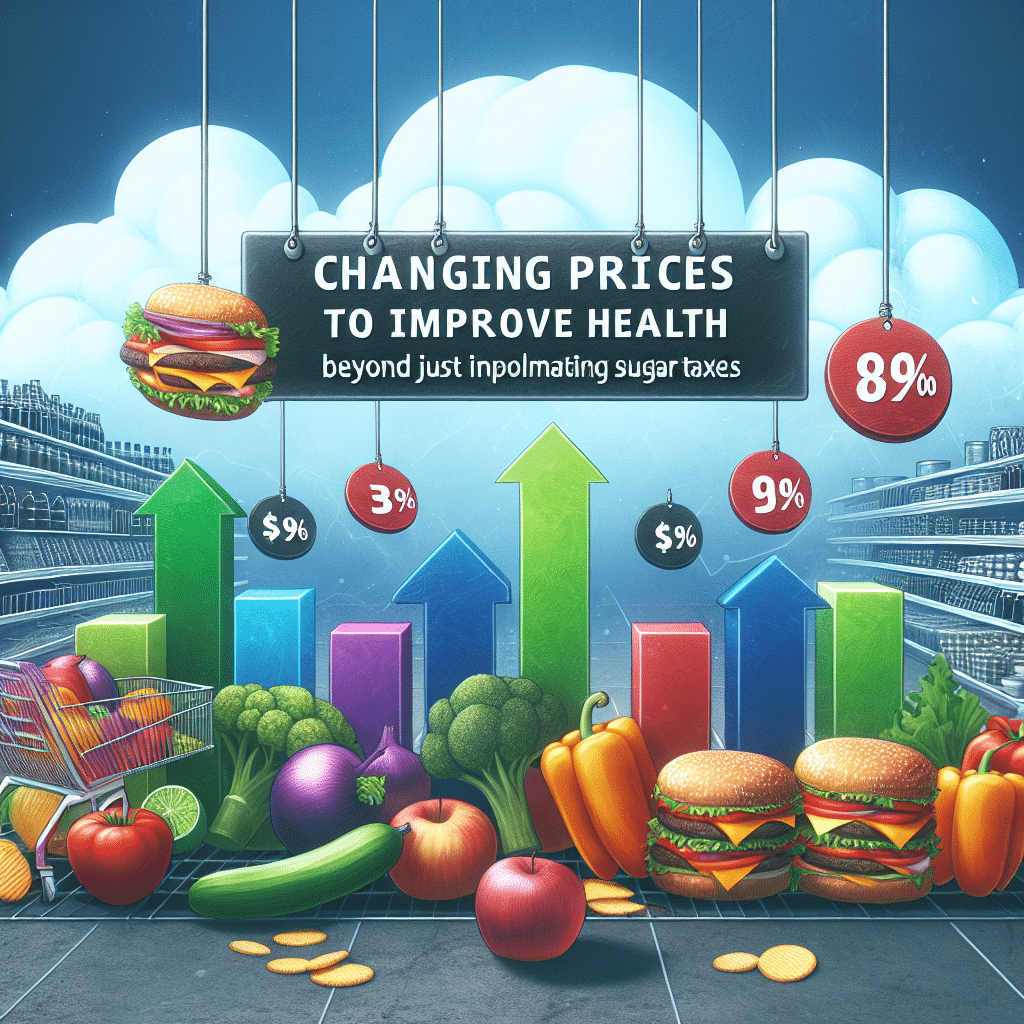Changing Prices to Improve Health: Beyond Sugar Taxes
-
Table of Contents
- Improving Health Through Pricing Strategies: Beyond Sugar Taxes
- The Impact of Sugar Taxes on Health
- Expanding the Pricing Strategy Toolbox
- Subsidizing Healthy Foods
- Variable Food Pricing Based on Nutritional Value
- Volume Discounts for Healthy Foods
- Challenges and Considerations
- Global Examples of Innovative Pricing Strategies
- Conclusion: The Future of Health-Focused Pricing Policies
- ETChem: Supporting Health with Quality Protein Products
Improving Health Through Pricing Strategies: Beyond Sugar Taxes

The global health landscape is witnessing a shift as policymakers and health advocates look for innovative ways to combat the rise of non-communicable diseases such as obesity, diabetes, and heart disease. One of the strategies that has gained traction in recent years is the implementation of sugar taxes. However, the conversation is evolving to include a broader range of pricing strategies aimed at improving health outcomes. This article delves into the potential of changing prices to promote healthier choices beyond the scope of sugar taxes.
The Impact of Sugar Taxes on Health
Sugar taxes, also known as soda taxes or sweetened beverage taxes, have been implemented in various countries with the goal of reducing sugar consumption. The rationale is simple: by increasing the price of sugary drinks, consumers are discouraged from purchasing them, leading to better health outcomes. Studies have shown that these taxes can lead to a decrease in the sales of sugary beverages and a corresponding increase in the sales of healthier alternatives.
- Case Study: Mexico’s sugar tax led to a 5.5% reduction in the purchase of sugary beverages in the first year and a 9.7% reduction in the second year.
- Case Study: Berkeley, California, saw a 21% drop in the consumption of sugary drinks within low-income communities after implementing a soda tax.
Expanding the Pricing Strategy Toolbox
While sugar taxes are a step in the right direction, they represent just one tool in the arsenal against unhealthy dietary habits. A multifaceted approach to pricing can have a more comprehensive impact on public health.
Subsidizing Healthy Foods
Subsidizing healthy food options is a strategy that can complement sugar taxes. By making fruits, vegetables, and whole grains more affordable, governments can incentivize healthier eating habits. This approach not only targets sugar reduction but also encourages a more nutritious overall diet.
- Example: In the United States, the Supplemental Nutrition Assistance Program (SNAP) provides incentives for purchasing fruits and vegetables at participating retailers.
Variable Food Pricing Based on Nutritional Value
Another innovative approach is to adjust food prices based on their nutritional value. Foods with higher nutritional benefits could be priced lower, while those with lower nutritional value could be priced higher. This strategy requires a robust system to assess and categorize the nutritional content of foods, but it could drive consumers towards healthier options.
Volume Discounts for Healthy Foods
Volume discounts are commonly used to encourage the purchase of larger quantities. Applying this strategy to healthy foods can make it more economical for consumers to buy them in bulk, promoting the consumption of healthier food items over less healthy alternatives.
Challenges and Considerations
While changing prices to improve health is a promising strategy, there are several challenges and considerations that must be addressed:
- Equity: Pricing strategies must be designed to ensure they do not disproportionately affect low-income populations.
- Industry Resistance: Food and beverage industries may resist changes that could impact their profits, necessitating careful negotiation and policy design.
- Consumer Behavior: Price is just one factor that influences consumer behavior. Education and awareness campaigns are crucial to support changes in pricing.
Global Examples of Innovative Pricing Strategies
Around the world, various countries are experimenting with pricing strategies to improve health outcomes:
- In Finland, a tax on confectionery, ice cream, and soft drinks was implemented alongside subsidies for school meals to encourage healthier eating habits among children.
- France introduced a tax on sugary drinks and has been exploring additional measures such as labeling systems that rank the nutritional quality of foods.
- The UK’s Soft Drinks Industry Levy not only taxes high-sugar drinks but also uses part of the revenue to fund programs for school sports and breakfast clubs.
Conclusion: The Future of Health-Focused Pricing Policies
As the evidence grows in support of pricing strategies as effective tools for improving health outcomes, it is clear that sugar taxes are just the beginning. A comprehensive approach that includes subsidies, variable pricing, and volume discounts for healthy foods, along with education and equitable policy design, can create an environment where making healthier choices is easier and more affordable for everyone. The key to success lies in the careful implementation and evaluation of these strategies to ensure they are achieving the desired health outcomes.
ETChem: Supporting Health with Quality Protein Products
In line with the goal of promoting healthier lifestyles, ETChem offers a range of high-quality protein products that can support a nutritious diet. Their extensive selection of collagens, including marine, fish, bovine, and chicken collagens, provides consumers with a variety of options to meet their health and dietary needs. ETChem’s commitment to quality and taste ensures that incorporating these protein products into one’s diet is both beneficial and enjoyable.
About ETChem:
ETChem, a reputable Chinese Collagen factory manufacturer and supplier, is renowned for producing, stocking, exporting, and delivering the highest quality collagens. They include marine collagen, fish collagen, bovine collagen, chicken collagen, type I collagen, type II collagen and type III collagen etc. Their offerings, characterized by a neutral taste, instant solubility attributes, cater to a diverse range of industries. They serve nutraceutical, pharmaceutical, cosmeceutical, veterinary, as well as food and beverage finished product distributors, traders, and manufacturers across Europe, USA, Canada, Australia, Thailand, Japan, Korea, Brazil, and Chile, among others.
ETChem specialization includes exporting and delivering tailor-made collagen powder and finished collagen nutritional supplements. Their extensive product range covers sectors like Food and Beverage, Sports Nutrition, Weight Management, Dietary Supplements, Health and Wellness Products, ensuring comprehensive solutions to meet all your protein needs.
As a trusted company by leading global food and beverage brands and Fortune 500 companies, ETChem reinforces China’s reputation in the global arena. For more information or to sample their products, please contact them and email karen(at)et-chem.com today.




